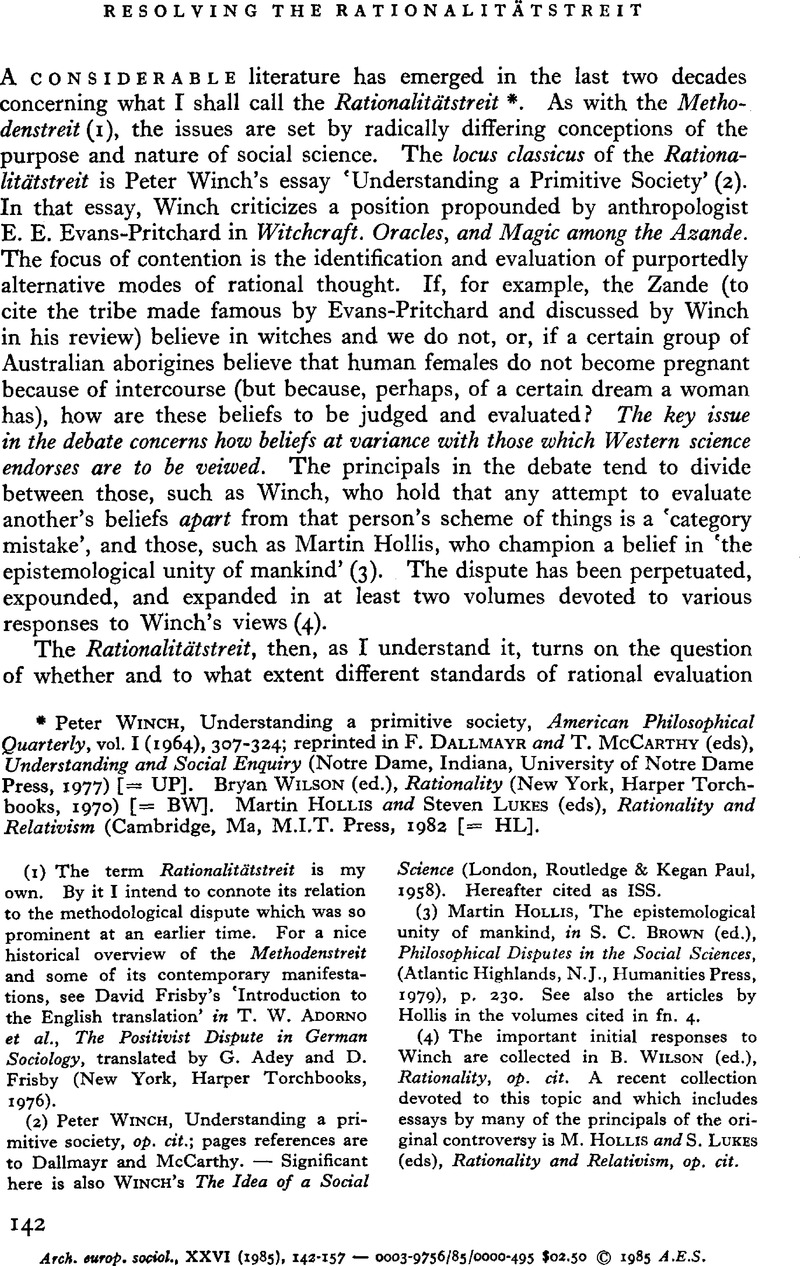Article contents
Resolving the Rationalitätstreit
Published online by Cambridge University Press: 28 July 2009
Abstract

- Type
- Notes Critiques
- Information
- European Journal of Sociology / Archives Européennes de Sociologie , Volume 26 , Issue 1 , May 1985 , pp. 142 - 157
- Copyright
- Copyright © Archives Européenes de Sociology 1985
References
* Winch, Peter, Understanding a primitive society, American Philosophical Quarterly, vol. I (1964), 307–324Google Scholar; reprinted in F. Dallmayr and T. McCarthy (eds), Understanding and Social Enquiry (Notre Dame, Indiana, University of Notre Dame Press, 1977) [= UP]. Wilson, Bryan (ed.), Rationality (New York, Harper Torchbooks, 1970) [= BW]Google Scholar. Hollis, Martin and Lukes, Steven (eds), Rationality and Relativism (Cambridge, Ma, M.I.T. Press, 1982) [= HL]Google Scholar.
(1) The term Rationalitätstreit is my own. By it I intend to connote its relation to the methodological dispute which was so prominent at an earlier time. For a nice historical overview of the Methodenstreit and some of its contemporary manifestations, see David Frisby's ‘Introduction to the English translation’ in Adorno, T. W. et al. , The Positivist Dispute in German Sociology, translated by Adey, G. and Frisby, D. (New York, Harper Torchbooks, 1976)Google Scholar.
(2) Peter Winch, Understanding a primitive society, op. cit.; pages references are to Dallmayr and McCarthy. — Significant here is also Winch's, The Idea of a Social Science (London, Routledge & Kegan Paul, 1958)Google Scholar. Hereafter cited as ISS.
(3) Hollis, Martin, The epistemological unity of mankind, in Brown, S. C. (ed.), Philosophical Disputes in the Social Sciences, (Atlantic Highlands, N.J., Humanities Press, 1979), p. 230Google Scholar. See also the articles by Hollis in the volumes cited in fn. 4.
(4) The important initial responses to Winch are collected in B. Wilson (ed.), Rationality, op. cit. A recent collection devoted to this topic and which includes essays by many of the principals of the orimitive ginal controversy is M. Hollis and S. Lukes (eds), Rationality and Relativism, op. cit.
(5) I discuss this point in detail in ‘Pseudo problems in social science’, forthcoming.
(6) Bernstein, Richard, Beyond Objectivity and Relativism (Philadelphia, University of Pennsylvania Press, 1983), p. 28Google Scholar.
(7) Ibid. The work of Kuhn's alluded to is, of course, The Structure of Scientific Revolutions, 2nd ed. enl. (Chicago, The University of Chicago Press, 1970). It is worth noting that this work was first published in 1962.
(8) I develop these points further in ‘On missing Neurath's boat’, forthcoming in Synthess and ‘Pseudo-problems in social science’, op. cit.
(9) Carnap, Rudolph, Meaning and Necessity2 (Chicago, The University of Chicago Press, 1956)Google Scholar.
(10) Ibid. p 221.
(11) For details, see my Pseudo-problems… op, cit. For more on the criticisms of Carnap sketched here, see Quine, W. V., On Carnap's views on ontology, in Quine's, The Ways of Paradox (New York, Random House, 1966)Google Scholar.
(12) Davidson, Donald, The very idea of a conceptual scheme, Proceedings and Addresses of the American Philosophical Association, XLVII (1973–1974)Google Scholar.
(13) Steven Lukes, Relativism in its appliplace, in Rationality and Relativism, op. cit., and Some problems about rationality, in Rationality, op. cit.
(14) Turner, Stephen, Sociological Explanation as Translation (Cambridge, Cambridge University Press, 1980)Google Scholar. Hereafter cited as T.
(15) See, in particular, Huff, D. and Turner, S., Rationalizations and the appliplace, cation of causal explanations of human action, American Philosophical Quarterly, XVIII (07 1981)Google Scholar.
(16) My own views on the prospects of a science of society are given in Who needs paradigms?, Metaphilosophy, XV (07/10 1984)Google Scholar.
(17) Pseudo-problems… op. cit.
(18) I have argued for this interpretation in Paradox and indeterminacy, The Journal of Philosophy, LXXV (07 1978)Google Scholar and Reconstructing Quine: the troubles with a tradition, Metaphilosophy, XIV (07/10 1983)Google Scholar.
(19) See Lukes, , Relativism in its place, op. cit. pp. 262, 272Google Scholar, for allusions to this argument and further references.
(20) Davidson, , op. cit. p. 7Google Scholar.
(21) Ibid. p. 19.
(22) Ibid. p. 20. Emphasis mine.
(23) Hollis, , The epistemological unity of mankind, op. cit. p. 230Google Scholar.
(24) Ibid.
(25) Quine uses this example in many of his writings. See especially, however, Quine, W. V., Ontological relativity, in Ontological Relativity and Other essays (New York, Columbia University Press, 1969)Google Scholar.
(26) Ibid. pp. 34–35.
(27) Horton, Robin, Material-object language and theoretical language, in Philosophical Disputes in the Social Sciences, op. cit. p. 203Google Scholar.
(28) Ibid.
(29) See references in fn. 18.
(30) Davidson, D. and Hintikka, J. (eds), Words and Objections (Dordrecht Holland, Reidel, 1969)Google Scholar.
(31) Quine, ibid. pp. 312–313.
(32) Ibid. p. 314.
(33) Turner, , op. cit. pp. 48–60Google Scholar.
(34) Lukes, , Relativism in its place, op. cit. pp. 283–292Google Scholar.
(35) Winch, P., Comment, Understanding and Social Inquiry, op. cit. p. 210Google Scholar.
- 1
- Cited by




